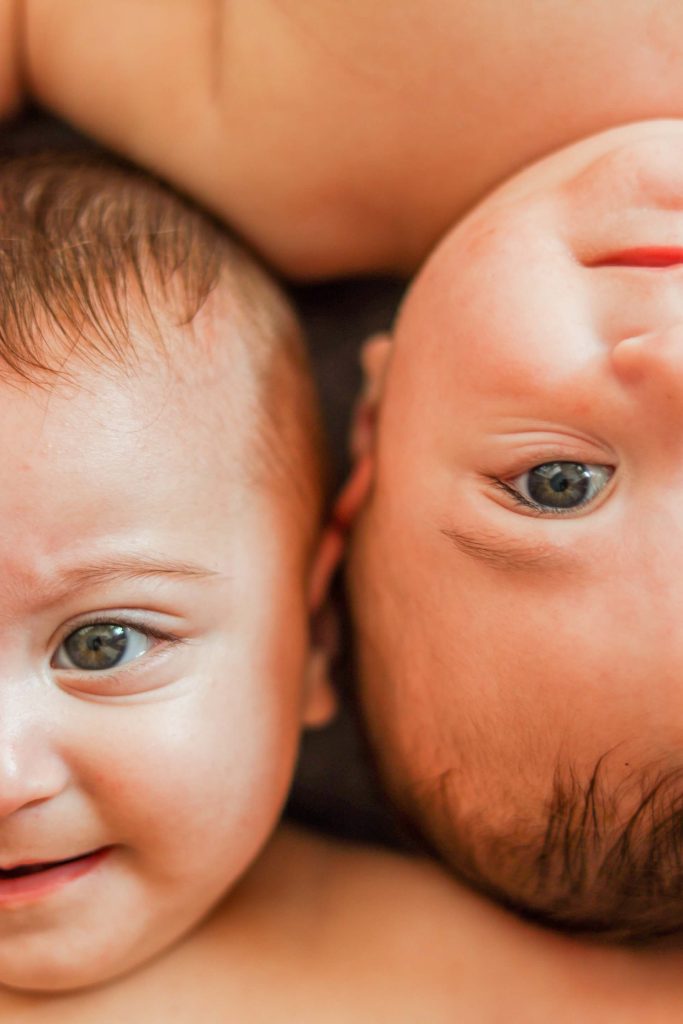Determining which twin is older depends on their birth order. In most cases, the first twin to be born is considered the older twin, while the second twin to be born is considered the younger twin.

There are two types of twins. They are:
- Fraternal Twins: Fraternal twins, also known as dizygotic twins, come from two separate eggs that are fertilized by two separate sperms. Fraternal twins can be either the same gender or different genders, and they may or may not look alike. For fraternal twins, the interval between births is usually around 10-45 minutes, with an average of about 20-30 minutes. This is because each fraternal twin has their own placenta and amniotic sac, so they are delivered independently of each other.
- Identical Twins: Identical twins, also known as monozygotic twins, come from a single fertilized egg that splits into two embryos. Although identical twins look almost alike, they may not always be the same gender. Identical twins are usually born within minutes of each other, so there is often no question about their birth order. For identical twins, the interval between births is typically much shorter, often just a few minutes or even seconds. This is because identical twins share a single placenta and amniotic sac, and are therefore usually delivered in quick succession.
In twins, birth order refers to the order in which each twin is born. In terms of birth order, the first twin to be born is referred to as the “older” twin, while the second twin to be born is referred to as the “younger” twin.
What determines birth order?

In most cases, the birth order of twins is determined by the position of each twin in relation to the birth canal during delivery. The twin who is closest to the birth canal is usually born first, while the other twin follows shortly afterward.
In some cases, the position of the twins can be reversed, with the second twin being born before the first twin. This can occur if the first twin is positioned higher up in the uterus than the second twin or if the first twin is in an awkward position that makes delivery more difficult.
Can twins be born on different days?

Although it is relatively uncommon, it is not entirely impossible. Twins can be born on different days. This typically occurs when the first twin is born just before midnight and the second twin is born just after midnight, with each twin being born on a different day.
In such cases, the twins will have different birth dates, and their ages will be calculated based on the date and time of their respective births. That way, you’ll have two birthdays in a row!
Does birth order affect twins?

Birth order can affect twins, just as it can affect singletons. However, the effects of birth order on twins may be different from those on singletons because twins are born together and share many experiences that singletons do not.
Here are a few ways in which birth order can affect twins:
- Personality: Birth order has been found to have an impact on personality in singletons, and the same may be true for twins. For example, the first-born twin may be more responsible and dominant, while the second-born twin may be more easygoing and rebellious.
- Health: Twins who are born first may be at a higher risk for certain health problems, such as cerebral palsy, because they may have experienced more stress during labor and delivery. Additionally, twins who are born second may be at a higher risk for certain developmental delays because they may have received less oxygen during delivery.
- Academic Achievement: Research has shown that first-born children tend to achieve higher levels of academic success than later-born children. This may also hold true for twins, with the first-born twin having a slight advantage in academic achievement.
- Relationships: Birth order can affect relationships between siblings, and this may also be true for twins. For example, the first-born twin may be more protective of the second-born twin, while the second-born twin may be more dependent on the first-born twin.
Does Birth Order Affect Personality?

Birth order can affect the personalities of twins, just as it can affect the personalities of singletons. However, the effects of birth order on twins may be different from those on singletons because twins share a unique bond and experience many things together.
Here are a few ways in which birth order can affect the personalities of twins:
- Firstborn twins: Firstborn twins may be more dominant and take on leadership roles in the relationship. They may also feel a sense of responsibility for their younger twin, and be more protective of them.
- Second-born twins: Second-born twins may be more laid-back and may look to their older twins for guidance and direction. They may also be more willing to take risks and try new things.
- Twins with a significant age difference: If there is a significant age difference between the twins, the older twin may act more like a firstborn, while the younger twin may act more like a second-born.
However, these generalizations are not always accurate. Each individual twin is unique. Other factors such as genetics, parenting style, and family dynamics can also play a role in shaping a twin’s personality. Additionally, twins may also develop their own unique dynamics and personalities that are influenced by their shared experiences growing up together.
Should you tell your twins who is older?

There is no right or wrong answer to whether or not you should tell your twins who is older, as this decision ultimately depends on personal preference and family dynamics. Some parents choose to tell their twins who is older from a young age, while others may decide to keep it a secret or not emphasize the age difference between their children.
It is important to keep in mind that while twins may have been born at the same time, they may still have different developmental stages, interests, and personalities. If you do decide to tell your twins who is older, you might want to make it clear that the older twin may not necessarily have an advantage in life.
Some parents may feel that it is important for their twins to know their birth order and see it as a way to establish individuality and help each twin develop their own sense of identity. Others may believe that emphasizing the age difference could lead to unnecessary competition or feelings of inferiority between the twins.
Ultimately, the decision to tell your twins who is older is up to you as a parent, and it is important to consider what will work best for your family dynamic and your twins’ individual needs.
Conclusion

Overall, while twin birth order differences can occur, they are typically minimal, and the relationship between twins is determined by many factors beyond their age difference.
Regardless of their birth order, you should encourage your twins to celebrate their similarities and differences and support them in developing their own individual identities while also cherishing their special twin bond.
Twins share a unique bond that is shaped by their shared experiences and the unique personalities they bring to the relationship.








